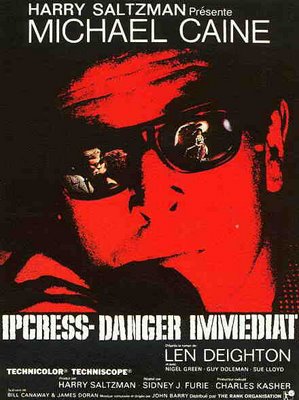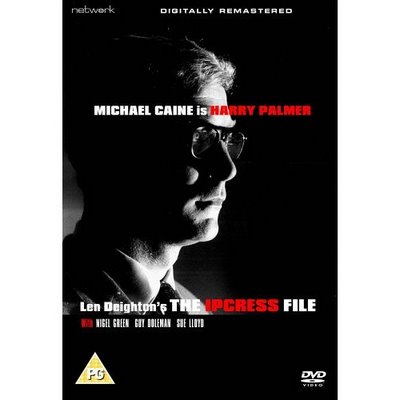 THE IPCRESS FILE (1965)
THE IPCRESS FILE (1965) (alternate title: Len Deighton’s The Ipcress File)
Cast: Michael Caine (Harry Palmer), Nigel Green (Dalby), Guy Doleman (Ross), Sue Lloyd (Jean), Gordon Jackson (Carswell), Aubrey Richards (Radcliffe), Frank Gatliff (Bluejay), Thomas Baptiste (Barney), Oliver MacGreevy (Housemartin), Freda Bamford (Alice), Pauline Winter (Charlady), Anthony Blackshaw (Edwards).
Crew: Sidney J Furie (director), Harry Saltzman (producer), Bill Canaway and James Doran (writers), John Barry (music), Otto Heller (cinematography), Peter Hunt (editor), Ken Adam (production designer).
Synopsis: British scientists are being abducted. A scientist called Radcliffe is taken from a London train. Harry Palmer is transferred to a counter-espionage unit run by Major Dalby. The prime suspects for the kidnappings are a man called Grantby, codenamed Bluejay, and his assistant, codenamed Housemartin. The police arrest Housemartin near a warehouse, but he is mysteriously murdered while in custody. Palmer has the warehouse raided, but it has already been vacated. Harry finds a tape marked IPCRESS. Palmer is quizzed about the case by his former boss, Colonel Ross from the Ministry of Defence. Dalby and Harry arrange to buy Radcliffe back from Grantby. At the exchange Palmer kills a US agent lurking in the shadows. Another US agent begins following Harry and threatens to kill him. Radcliffe can no longer recall his own research. The meaning of the word IPCRESS is discovered – it refers to brainwashing. An agent who borrows Palmer’s car is murdered, having been mistaken for Harry. Palmer returns to his flat and finds the second US agent dead inside. The Ipcress file is stolen from Harry’s desk. Palmer is abducted by Grantby and brainwashed, but manages to escape. Harry realises either Dalby or Ross is working with Grantby. He confronts both men. Dalby is revealed as the traitor, ordering Palmer to murder Ross. But Harry kills Dalby in self defence. Ross admits using Palmer as bait to catch Dalby…
Len Deighton’s first novel, The Ipcress File, was published in 1962. The low key espionage thriller was a stark contrast to the James Bond novels written by Ian Fleming. Deighton’s story was told in the first person by an unnamed secret agent. The film rights were acquired by Charles D Kasher, who collaborated on the project with producer Harry Saltzman. Saltzman had produced the early Bond films in partnership with Cubby Broccoli, but The Ipcress File required a different approach.
Christopher Plummer was offered the role of Harry Palmer, but turned it down to star in The Sound of Music. In a 1969 interview with Films and Filming, Caine recalled how he was offered the part: ‘Saltzman saw Zulu and afterwards, I mean that same evening, he went to dinner at a restaurant … and I just happened to be there. He gave me the job just like that. Looking back, people imagine that my break came with Zulu. But quite honestly that’s just what didn’t happen, it was a year later … The Ipcress File made me a star.’
Canadian-born Sidney J Furie was hired to direct the movie. ‘The whole idea was to do the opposite of Bond,’ he explains on the film’s DVD commentary. The project almost collapsed just before shooting was to begin, when its financing was withdrawn. Saltzman told Furie to start anyway, pledging to fund the production from his own pocket. ‘He threatened Universal and Rank with a lawsuit and forced them to go ahead,’ Furie says.
The Ipcress File was shot over three months at locations around London, and at Pinewood Studios. Production designer Ken Adam transformed the rooms in a single house near Victoria Station into a series of sets, with Palmer’s flat on the top floor. Saltzman and Furie clashed repeatedly during filming. ‘The producer didn’t like all the funny [camera] angles and what I was doing. Harry wanted me fired,’ Furie says. Editor Peter Hunt was brought in by Saltzman to assess what had been shot, wanting confirmation Furie should be dismissed. On the same DVD commentary Hunt backs up this version of events. Hunt refused to confirm Saltzman’s and Furie stayed on the picture.
The director says he had no faith in the script: ‘There were many scripts but we were never happy with them. The script was being rewritten every day. We could only shot what had been written.’ Furie was so upset by the script he set fire to a copy during filming and then burst into tears. But he says Caine was able to get the best from the material. ‘The dialogue on paper was nothing. Michael would give it this inflection – he made it work.’ Furie says Caine was one of the greatest actors he ever worked with.
Problems continued during filming with studio bosses questioning the wisdom of having Palmer wear glasses or cook meals, as Caine recalled in a 2002 interview with Venice magazine: ‘Up until that point, all heroes in action films had been perfect … With the glasses, we gave him an imperfection, to make him more like an ordinary person. Also, we had him cook a meal. One of the producers said, “No, no, you can’t do that! Everyone will think he’s gay!”’ Caine pointed out that Harry was cooking for a woman to get her into bed, and the scene stayed. In the film Deighton’s hands are seen doing most of the cooking. The author’s culinary newspaper column can also be seen, pinned to Palmer’s kitchen wall.
Caine talked about Harry Palmer in a 1965 interview with the Evening News. ‘He’s a very human fellow. We’ve gone for real people, and how they get out of real trouble. The things you remember about the Bond films are the Aston Martin, and the other gimmicky effects. In ours, if someone gets shot – they die. We work on the principle that the way to make a good thriller is to make it so realistic that everyone identifies with it.’
The Ipcress File reached British cinemas in March 1965, rated A. Most critics were full of praise for the anti-Bond film and it did brisk business at the box office. The Ipcress File won BAFTAs for best British film, art direction and cinematography. Caine was nominated as best British actor and the screenplay also got a nomination. The picture reached US cinemas in August, where it impressed reviewers and audiences. Caine told Playboy in 1967 that the film’s success in the US had surprised him: ‘I suppose I underestimated the intelligence of audiences, which people in show business do all the time. We made The Ipcress File very cheaply, expecting, if we were lucky, to break even or make a little profit. I thought it would be a rather specialised movie.’
 The Ipcress File was released on video in 1987, reclassified as a PG. It remains available on VHS and DVD in the UK and America. However, the US DVD is superior, with the film in widescreen and a commentary track by Furie and Hunt. The UK disc is a budget price, full-screen version that utterly fails to convey the film’s unusual and eye-catching cinematography. In September 1999 the BFI took a poll of 1000 people within the industry to find the Top 100 British movies of the twentieth century. The Ipcress File was one of seven Caine pictures on the list, being voted into 59th place. [A much improved Region 2 DVD has since been released.]
The Ipcress File was released on video in 1987, reclassified as a PG. It remains available on VHS and DVD in the UK and America. However, the US DVD is superior, with the film in widescreen and a commentary track by Furie and Hunt. The UK disc is a budget price, full-screen version that utterly fails to convey the film’s unusual and eye-catching cinematography. In September 1999 the BFI took a poll of 1000 people within the industry to find the Top 100 British movies of the twentieth century. The Ipcress File was one of seven Caine pictures on the list, being voted into 59th place. [A much improved Region 2 DVD has since been released.]Reviews: ‘Michael Caine’s performance installs him as the first mod conman of the new British crime wave.’ – Sunday Telegraph
‘Michael Caine who plays Harry Palmer is the new style secret agent: everything that James Bond is not and all the better for it.’ – Evening Standard
Verdict: Caine believes his film star status starts with The Ipcress File and you can see why. It’s a great picture and a wonderful showcase for his burgeoning talent as a screen actor. He displays remarkable assurance in his first leading role, giving life and humanity to what could have been a very one-dimensional character. Furie’s determination to shoot every scene from an unusual angle may irk some, but it has kept this film feeling fresh nearly forty years later, unlike subsequent Harry Palmer pictures. Mention must be made of John Barry’s vocative score and the sparse sets by Ken Adam – both men giving the film a decidedly different flavour from the Bond features on which they also worked. The Ipcress File is among the best movies Caine made in the 1960s. But if you are going to watch it, find a widescreen version so you can savour the full effect.
1 comment:
I'm enjoying these Dave. He made some great movies. He did make some stinkers too but they would have stunk a whole lot more if it weren't for him.
Post a Comment